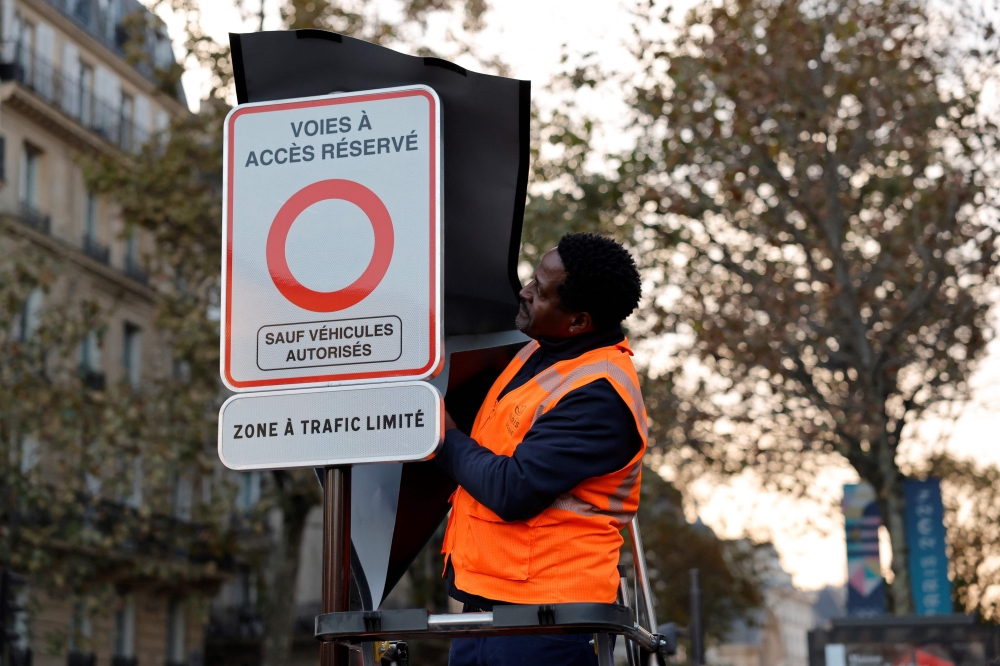Published date
Written by
PARIS, Nov 6 — Paris has banned through-traffic from parts of its historic centre to cut pollution and congestion, with the city’s police chief vowing however that the new rules would be enforced with a light touch.
Cars and other motorised vehicles including motorbikes are no longer able to go into the French capital’s first, second, third and fourth districts — or arrondissements — unless they have business there.
The area of 5.5 square kilometres includes the Louvre museum, the glitzy Place Vendome, the Tuileries gardens and the historic Marais neighbourhood as well as many cultural venues and shopping areas.
Paris mayor Anne Hidalgo has long sought to limit car traffic in favour of less polluting means of transport, notably bicycles.
Over the past decade, the city has turned several areas previously dominated by cars over to cyclists and pedestrians, including stretches of the banks of the river Seine.
Much of the busy Place de la Concorde is set to be next, and the Iena bridge near the Eiffel Tower has not reopened to traffic since the Olympics.
Hidalgo promised the transit ban during her 2020 re-election campaign for mayor, but its implementation was postponed several times.
‘Ambitious’
Other European cities including Rome, Milan and Madrid have taken similar measures, but the Paris mayor’s office said its own traffic limitation scheme was “one of the most ambitious” on the continent.
The new through-traffic rules require drivers to carry proof that they have a reason for being there and not just “using the centre of Paris as a shortcut”, said Ariel Weil, mayor of central Paris.
People who live or work in the area have free access, as do buses, taxis, emergency servic

es and disabled drivers.
Anyone else who can show that they are “stopping there” for a doctor’s visit or to make a delivery can pass, too. Going to the cinema or the theatre is also an acceptable reason to drive into the area.
Paris officials have said that there would be no fines for the first six months to allow drivers to get accustomed to the new rules.
Paris police chief Laurent Nunez, who rarely sees eye to eye with city hall on the question of car traffic, promised to ensure that there would be “as few constraints as possible” for motorists.
He told Le Parisien newspaper that measures such as online registration, which was used to enforce traffic restrictions during the Paris Olympics this summer, “is not what I favour”.
‘Almighty mess’
Deputy mayor for transport David Belliard, a member of France’s Green party, said that the city was still working out how exactly the new rules would be enforced, and would establish a list of accepted documents in collaboration with police services.
Motorists themselves appeared unsure about the new rules.
“We’re not happy with this ban,” said the driver of a delivery van stopped by a police officer Monday before being told that he could pass as “you’re working”, as she handed him an explanatory leaflet.
“I hope my residential parking sticker will be enough,” said a psychologist who rides her scooter through the zone each day.
Officials say they expect a noticeable improvement in terms of air and noise pollution from the measure, especially for the 110,000 residents of the four districts. Major thoroughfares like the Avenue de l’Opera, which runs from the old opera house to the Palais Royal, could see car traffic cut by a third.
Critics say the new rules will simply shift transit traffic to adjacent neighbourhoods such as the city’s historic Left Bank which is not covered by the ban.
“It’s going to be an almighty mess,” said Aurelien Veron, spokesman for the Changer Paris (Change Paris) opposition group in the Paris municipal council.
But city hall officials said projections showed that any additional traffic in neighbouring areas would be “extremely limited”.
Some shop owners, meanwhile, said they feared that traffic restrictions could hurt business.
“If city hall wants to kill local shops this is the way to do it,” said Patrick Aboukrat, regional president of the France’s national clothes manufacturing association.
He told the “Echommerces” trade magazine that shop owners would challenge the new transit rules in court. — AFP
